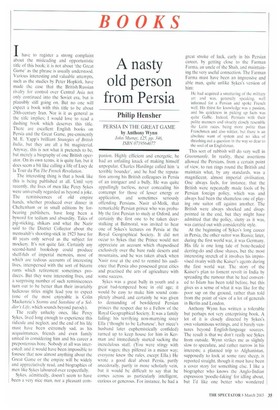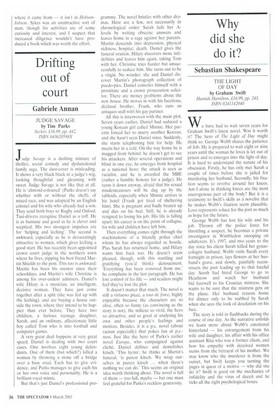A nasty old person from Persia
Philip Hensher
PERSIA IN THE GREAT GAME by Anthony Wynn John Murray, £25, pp. 346, ISBN 0719564077 Ihave to register a strong complaint about the misleading and opportunistic title of this book; it is not about 'the Great Game' as the phrase is usually understood. Various interesting and valuable attempts, such as the studies by Peter Hopkirk, have made the case that the British/Russian rivalry for control over Central Asia not only continued into the Soviet era, but is plausibly still going on. But no one will expect a book with this title to be about 20th-century Iran. Nor is it as general as the title implies; I would love to read a dashing book which deserves this title. There are excellent English books on Persia and the Great Game, pre-eminently M. E. Yapp's brilliant Strategies of British India, but they are all a bit magisterial. Anyway, this is not what it pretends to be. but merely a biography of one British operator. On its own terms, it is quite fun, but it does seem a bit like calling a life of Lucy de la Tour du Pin The French Revolution.
The interesting thing is that a book like this is being published at all. Until very recently, the lives of men like Percy Sykes were universally regarded as beyond a joke. The reminiscences of old empire hands, whether produced over dinner in Cheltenham or in small editions by forbearing publishers, have long been a byword for tedium and absurdity. Tales of pig-sticking, shikars and what the Nazir said to the District Collector about the memsahib's shooting-stick in 1923 have for 40 years only served as the subject for mockery. It's not quite fair. Certainly any second-hand bookshop could produce shelf-fuls of imperial memoirs, most of which are tedious accounts of interesting lives, interspersed with the sort of bizarre rants which retirement sometimes produces. But they were interesting lives, and a surprising number of such reminiscences turn out to be better than their invariably ludicrous titles might lead you to expect (one of the most enjoyable is Colin Mackenzie's Storms and Sunshine of a Soldier's Lift, which sounds beyond parody).
The really unlucky ones, like Percy Sykes. lived long enough to experience this ridicule and neglect, and the end of his life must have been extremely sad, as his acquaintances, friends and even family united in considering him and his career a preposterous bore. Nobody at all was interested: and it would have been impossible to foresee that now almost anything about the Great Game or the empire will be widely and appreciatively read, and biographies of men like Sykes laboured over respectfully.
Sykes, admittedly, doesn't seem to have been a very nice man, nor a pleasant corn panion. Highly efficient and energetic, he had an unfailing knack of making himself unpopular. Charles Hardinge called him 'a terrible bounder', and he had the reputation among his British colleagues in Persia of an intriguer and a bully. He was quite appallingly tactless, never concealing his contempt for those of lesser energy or application, and sometimes seriously offending Persians. Nasir ul-Molk, that remarkable Persian prince who was probably the first Persian to study at Oxford, and certainly the first one to be taken deerstalking at Balmoral, was invited to hear one of Sykes's lectures on Persia at the Royal Geographical Society. It did not occur to Sykes that the Prince would not appreciate an account which rhapsodised exclusively over the bare rude deserts and mountains, and he was taken aback when Nasir rose at the end to remind his audience that Persia also possessed great cities and practised the arts of agriculture with some success.
Sykes was a great bully in youth and a great bad-tempered bore in old age; it would be easy to make him sound completely absurd, and certainly he was given to demanding of bewildered Persian princes the respect due to a Fellow of the Royal Geographical Society. It was a family failing; his terrifying non-marrying sister Ella (thought to be Lebanese', her niece's husband later euphemistically confided) turned up to keep house for him in Kerman and immediately started sacking the incredulous staff. (You were stingy with their wages; they pilfered in a minor way; everyone knew the rules, except Ella.) He wrote a good deal about Persia, partly anecdotally, partly in more scholarly vein, but it would be difficult to say that he comes across as particularly intelligent, curious or generous. For instance, he had a great stroke of luck, early in his Persian career, by getting close to the Farman Farma, an uncle of the Shah, and maintaining the very useful connection. The Farman Farma must have been an impressive and able man, quite unlike Sykes's version of him:
He had acquired a smattering of the military art and was, generally speaking, well informed for a Persian and spoke French well. His thirst for knowledge was a passion, and his quickness in picking up facts was quite Gallic. Indeed, Persians with their polite manners and vivacity closely resemble the Latin races, being more polite than Frenchmen and also wittier, but there is an absolute want of system and no idea of thrashing out a question in the way so dear to the soul of an Englishman.
This sort of rubbish will do very well in Greenmantle. In reality, these assertions allowed the Persians, from a certain point of view, to run rings round the British and maintain what, by any standards, was a magnificent, almost imperial civilisation. One always feels, for instance, that the British were repeatedly made fools of by Persian foreign policy, which was and always had been the shameless one of playing one suitor off against another. The British were always shocked and disappointed in the end, but they might have admitted that the policy, slutty as it was, was carried out with considerable style.
At the beginning of Sykes's long career in Persia, the other suitor was Russia; later, during the first world war, it was Germany. His life is one long tale of bone-headed derring-do and close shaves, but the most interesting stretch of it involves his improvised rivalry with the Kaiser's agents during the first world war. The story of the Kaiser's plan to foment revolt in India by spreading the rumour that he had converted to Islam has been told before, but this gives us a sense of what it was like for the poor sap on the ground, rather than told from the point of view of a lot of generals in Berlin and London.
Anthony Wynn has written a tolerable but perhaps not very enterprising book. A lot of it is closely directed by Sykes's own voluminous writings, and it barely ventures beyond English-language sources. The result is that we don't really see Sykes from outside. Wynn strikes me as slightly slow to speculate, and rather narrow in his interests; a planned trip to Afghanistan, supposedly to look at some rare sheep, is reported straight, though it must have been a cover story for something else. I like a biographer who knows the Anglo-Indian expression `poodle-faking' for idling about, but I'd like one better who wondered
where it came from — it isn't in HobsonJobson. Sykes was an unattractive sort of man, though his activities are of some curiosity and interest, and I suspect that increased diligence wouldn't have produced a book which was worth the effort.



































































 Previous page
Previous page